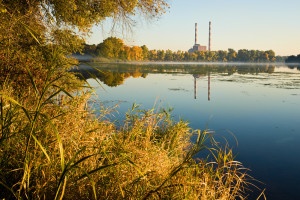We have much more to do and your continued support is needed now more than ever.
2012 Budget a Victory for Great Lakes, Wildlife

Whitefish faced many serious threats in the Detroit River. Hardening of the river’s shoreline, dredging of rocky spawning grounds on the river bottom, and industrialization along the river leading to pollution and sewage contamination drove the fish out of the river. The year 1916 marked the last time researchers documented whitefish spawning in the river.
But that changed. Passage of the landmark Clean Water Act in 1972 and investment to fix the nation’s sewers help cut discharges of pollution and waste into the Detroit River. The formation of the Detroit River International Wildlife Refuge in 2001—the first International Wildlife Refuge in North America—led to an unprecedented effort by citizens, businesses and federal agencies to restore this urban refuge.
The removal of steel and concrete along the river’s shores—combined with efforts to restore area habitat and wetlands—helped heal the river so that now mayflies, yellow perch, lake sturgeon and bald eagles have returned after a decades-long absence. And, in 2006, scientists once again observed whitefish spawning in the river.
Restoration of the Detroit River is part of a larger effort to restore the health of the Great Lakes. Thanks to the 2012 budget, restoration efforts will keep moving forward to help the recovery of whitefish and other fish and wildlife which depend on the Great Lakes.
Fish, Wildlife, Great Lakes Winners in 2012 Budget
The 2012 federal budget provides strong support for Great Lakes programs. The budget provides $300 million to restore fish and wildlife habitat, clean up toxic pollution that poses a health risk to people and wildlife, and stop pesticide, fertilizer, oil, grease and other polluted run-off from farms and cities. It also supports efforts to confront invasive species like the Asian carp that threaten native fish and wildlife.

“The 2012 budget represents a significant victory for fish, wildlife and the Great Lakes,” said the National Wildlife Federation’s Jeff Skelding, who serves as campaign director for the Healing Our Waters-Great Lakes Coalition. “This investment is critical for Great Lakes fish and wildlife.”
Delivering Results for Wildlife
In communities around the region, Great Lakes restoration activities are producing results and making a difference for wildlife.
- In Northern Michigan, replacing a culvert that restricted the Platte River, a blue ribbon trout stream, is helping to restore the river’s natural flow and to reduce stream bank erosion that was suffocating prime spawning areas for trout and salmon.
- Near Buffalo, N.Y., removing invasive plants and restoring a 15-acre wetland on Buffalo Creek, is helping improve fish and wildlife populations in the creek—as well as bolster efforts to restore the Buffalo River.
- In Cleveland, Ohio, removing an old dam from Euclid Creek is allowing fish and other aquatic life to return to the waterway and helping to improve water quality.
More, however, needs to be done.
Vision for a Revitalized Great Lakes
The decades-long assault on the Great Lakes will not be cured over night. Habitat destruction, sewage contamination, invasive species and toxic pollution like PCBs have taken a heavy toll on the Lakes and its wildlife, leading to the extinction of species like the blue pike and drastic decline of other species such as lake trout.
That’s why more than 1,500 citizens came together in 2005 to craft a plan to restore the Great Lakes and the fish species that relied on them, such as whitefish, lake herring, lake trout, yellow perch, walleye, coaster brook trout, lake sturgeon, American eel, and Atlantic salmon.
That plan—supported by the National Wildlife Federation—offers manageable solutions to bring back the Lakes and its wildlife. It’s great that the 2012 federal budget supports actions to restore the Great Lakes. It will be equally important for the U.S. Congress and President Obama to maintain support for these programs in the 2013 budget and beyond. Cutting funding will only make problems worse and more costly to solve.





















